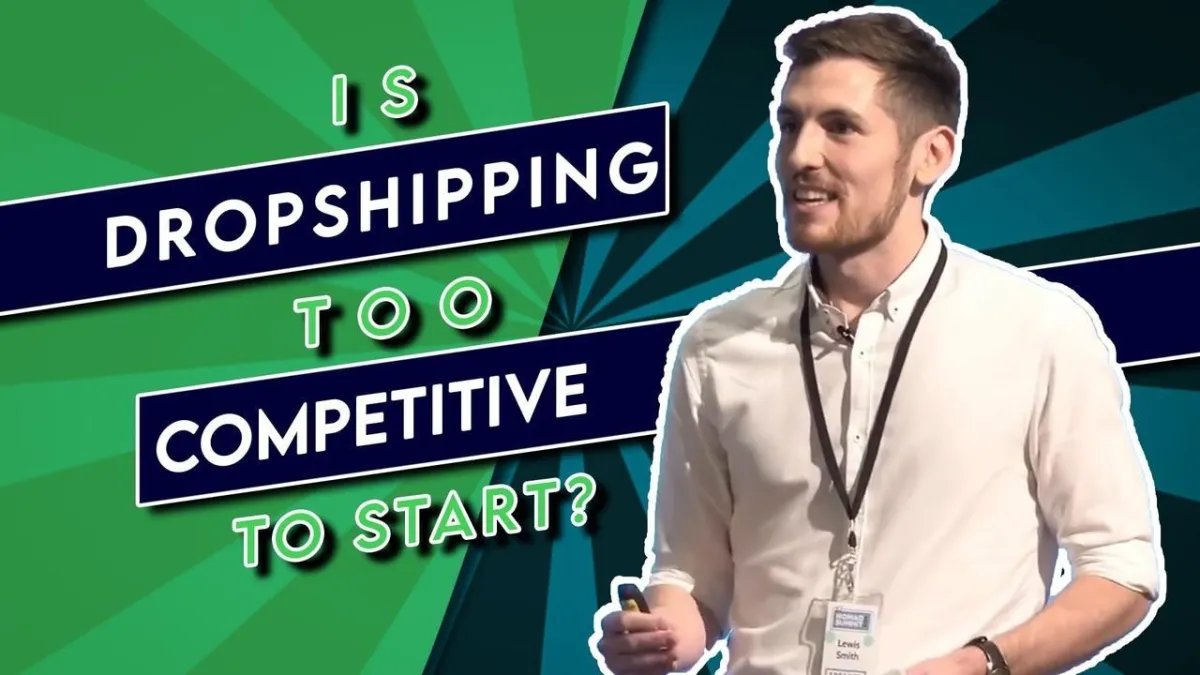DROPSHIP UNLOCKED BLOG
Click the posts below to read/watch them in full.

Lewis Smith - Dropship Unlocked - Is Dropshipping Too Competitive To Get Started?
By Lewis Smith - Dropship Unlocked
Yeah. My name is Lewis Smith. And in today's video, what we're going to talk about is competition. And the main thing that we're really going to focus on is a question that I get asked a lot of the time which is, how do you know if there's too much competition? And that can be thought of in terms of dropshipping in general, as a business model, but also people looking to start dropshipping businesses and considering selling a certain subset of products like a niche. They might think, "Well, how do I know if that particular market is too competitive?" So, that's what we're going to cover in today's Live with Lewis.
So before we get started, and if you're interested in taking kind of a more in-depth dive into this, you really are interested in this kind of thing, then you can head over to... Let's see if this works. DropshipUnlocked.com/FREE. And if somebody who's joining this either live or on the replay could very kindly put that in the comments for us, that would be much appreciated. And that's where we run an on-demand training that you can access. And we'll kind of break this down in a lot more detail than I'm probably able to go into in one of these videos.
But when it comes to competition with dropshipping or any kind of competition really, we all know that it's a balance. Right? You need to find that balance between finding a market where there's money being made, where there's enough people buying and spending money that it's worth you going into business in there. But a huge question that often holds people back, I think, is how much is too much? How much competition is too much? And I guess more importantly than that, how do they compete? Because going into a market that's competitive is one thing, but going into it with any chance of succeeding and turning that competition into your own advantage is completely different.
And I get this all the time. I mean, clients come to me because they want to build an e-commerce business. They like the idea of dropshipping because they don't have to spend thousands on stock or purchase items from China or worry about getting their Amazon account shut down. It's something where they control the business and they like that. They want time and location freedom. That's something that they're trying to achieve with this. And they want that financial security that a dropshipping business can bring you over the longterm if you pick the right market. Okay. And that's what it all comes down to.
And even though the clients that come to us have money to invest, they understand this is not one of those get rich quick type business models. Those in my experience, anyway, just generally don't exist. And they're committed to building a longterm business with this. Right? This is something that they want to do over the long term, but they're worried about spending the next six months kind of wasting time building something that's just going to lead nowhere. And I completely get that. I relate to that frustration. And that's effectively, sometimes in entrepreneurship unavoidable to a certain extent, because if there were guarantees with entrepreneurship, everyone would do it. Right? No one would work a job. Everyone would just create their own company if it was a hundred percent successful.
So that's the thing I think that people are a little bit concerned about. The other thing is that they're worried about not making sales sometimes. So they think, "I could create this site and it might be an in demand niche, but how do I know if I'm actually going to generate any sales or do it profitably?" That's definitely one that gets people as well I think. And the other thing is going into a market as a newbie. Because the people that we work with haven't generally built these types of businesses before. They might've been in business already, they might have a full-time job and they kind of want to transition out of that working nine to five, trading their time for money, into having a business that they can run from a laptop from anywhere in the world.
But they look at the markets that they're going into and think, "Well, how on earth am I supposed to compete with these huge players where they've got hundreds of thousands of pounds of marketing budget that they can put towards things like SEO marketing, et cetera?" And that's something that I think gets people. People think, "How am I supposed to go in here? Surely I would need years of content marketing, of blog posts to be able to get something that can compete on that level." And I get it. It makes sense. I feel exactly the same when I first started this. It's something that we can definitely relate to.
But here's the thing. I mean, I think a market needs competition. I think that competition is a good sign. Right? And I'm not saying that from the perspective of, "Oh. It makes us all better and it pushes us to succeed." That is true to an extent, but when you're first getting started with this, I always say to people, if you're not finding any competition... Because people come to me and say, "I found a niche. I think it's a good one. I'm going to go after it." My first question is, "Well, who have you found that's in that market already? Who are your competitors?" Because if they say it's great because there's not really that much competition, immediately alarm bells start going off for me.
Because I say to those clients that if that's the case, do you think that you... do you back yourself to be the person that has discovered the niche that has never been discovered before, the market that's never been found before? And the reality is you might have struck gold, but the reality is if you are the only one in there, there's probably a reason for it. There's probably some kind of barrier to entry.
And so I'll share an interesting story about that in just a minute. But before I get started for anyone that is watching live or on the recording of this, if you're interested in finding out exactly how we verify that level of competition and kind of figure out whether it's a viable market, you can head over to DropshipUnlocked.com/FREEfor an on-demand training where we go into a lot more detail on exactly how we do that and how to figure out whether it's a viable market.
So yeah. As I was saying, I remember this one time where I was walking through the streets of London with my wife, I was out on a leisurely walk and we were kind of walking through and I noticed that down this particular street in London, and it's quite a famous street, there were a lot of these fabric shops. These kinds of textile shops, you probably know the ones I mean, where they have rolls of fabric in the window and they're kind of selling to people that make clothes, et cetera. And I kind of saw it, didn't think anything of it. But then I looked across the street and I realized that there were two more. It's pretty much exactly the same shops selling the same kinds of things. And I thought, "Okay. Interesting." They're all kind of competing with each other.
And as we walked down that street further and further, I noticed another one, another one, another one. And I'm thinking, "How on earth are they competing with each other? How are these shops all still in business if they're all just essentially selling the same thing?" Right? You're probably thinking that too. Kind of how would that work? But then we noticed something interesting. Right? So we were walking a little bit further down the road, didn't think too much of it, just thought it was a bit strange that they're all congregated in one area, and then I see ta-da, there's a huge fashion college just around the corner where there's thousands of students creating clothes for their fashion project as they're learning how to become fashion designers and things. They're going to need a constant supply of fabric. They're going to need those textiles.
And so I started to think, "Okay. Well I guess now it makes sense why there are so many of those shops." Because they know that that market is in demand because they've got a consistent requirement. There's a consistent demand there from people that are requiring those textiles and fabrics. And I thought, "Well, that's really interesting." Because now it doesn't become a case of is there too much competition, it becomes a case of is there enough demand? Right? These people didn't just open up their shop there because they thought, "I just have a go and that seems like a good street to do it."
They came because there was an existing market. They knew that there was a demand of customers or demand from customers requiring certain products and they thought, "Well, why would we go and set up our fabric shop or our textile shop in a street that maybe there's no guarantee of making sales? That's just not a sensible thing to do." But that is the equivalent of the clients that come to me and say, "I found a niche. It's got no competition. It's great."
That's like saying, "Well, let's go and start a textile shop in the middle of the countryside." It might work, you might get a really loyal fan base, but it's going to be harder. You're going to have to really drum up interest and in the digital marketing world... Right? So in e-commerce drumming up interests like that costs money. Right? That's going to be hard or is going to take a lot of time and effort.
But if you were to go and just go into the market that already exists and you can see that actually there's a lot of people there selling already, and there's a lot of people buying there already, create a business that serves the existing demand. It's cheaper, it's going to be easier for you. And if the market's there and consistent, think about the stability over the long term. Right? Do you want a business that fluctuates wildly throughout the year or when a certain trending type of product dies down or do you want one that's always going to be in demand? Right?
That's the kind of thing you have to think about. So that's why I think competition is an advantage. And if you're interested in taking a really kind of clear look into how we do this in a step by step format and really understanding how you could apply it too, then head over to DropshipUnlocked.com/FREE. As I say, if you're watching live, or if you're watching the recording of this, someone could put that in the comments section, that would be amazing. So yeah. I mean to wrap it all up, here's what we know I guess at this stage. Right? From what I've been discussing here.
If there's no competition, don't think of that as a good sign, think of that as alarm bells. Why is there no competition? Are you really the one that has discovered this amazing market where you could be the first person in it? And even if you have, how long is that going to last. Right? Even if you have nailed it and you've got your entry to market timing perfect, how long before that becomes saturated? Right? And is that market going to be big enough to support you and all those competitions?
So if you think about it like a huge pie, as the pie grows, it can feed more and more people. As the pizza grows, you can get more and more slices out of it. So think of that in terms of the size of the market, the size of the demand. Of course it's okay to have competition when you've got enough of it to go around. Right? And so the lack of competition for me is a worrying sign. That's the thing you should be looking out for.
Look out for a market where there's no competition and think, "Probably not one I want to venture into." Right? So I just wanted to thank you guys for anyone that joined us live so far on the video, on the Live with Lewis or the Stream with Smith, we're still undecided about the title of what we're going to call these. And yeah. I just want to say thanks for joining me today. If you have any questions, we are live at this stage, so feel free to put them in the comments and we'll be able to help you out with those I hope.
And if you found this useful, if this was kind of a useful perspective for you and you want to see more of these types of trainings, then feel free to let me know in the comments. Please let me know. And if you could just do me a favor and give the video a like, that would be just wonderful. I'd really appreciate that. And likewise, if you know anyone else, perhaps you've got a friend or a family member or a colleague that you've been talking to about dropshipping and this whole e-commerce thing, and you think that it would be valuable for them too, click the share button. Let them know, let them see it too, help them out. Right?
So I think that's probably going to be it for today. Yeah. I mean, thank you everybody for joining. And don't forget if you want to go deeper into this, the link is on the screen here and I'll put it in the description as well. So you can head to DropshipUnlocked.com/FREE where we're running an on-demand training, we can go much deeper into all of this stuff about not only competition, but all of the other criteria that we would advise looking for when you're launching a dropshipping business. So with that said, guys, thanks very much and have a great day.


How to Start a UK Dropshipping Business Offering Next-Day Delivery...
Learn to find profitable products, sign reputable UK suppliers and build a sustainable brand.

About
The Masterclass
Reviews
Watch Our Training
Blog
IMPORTANT: Earnings and Legal Disclaimers: We cannot and do not make any guarantees about your ability to get results or earn any money with our ideas, information, tools, or strategies.
Nothing on this page, any of our websites, or any of our content or curriculum is a promise or guarantee of results or future earnings, and we do not offer any legal, medical, tax or other professional advice. Any financial numbers referenced here, or on any of our sites, are illustrative of concepts only and should not be considered average earnings, exact earnings, or promises for actual or future performance. Use caution and always consult your accountant, lawyer or professional advisor before acting on this or any information related to a lifestyle change or your business or finances. You alone are responsible and accountable for your decisions, actions and results in life, and by your registration here you agree not to attempt to hold us liable for your decisions, actions or results, at any time, under any circumstance.
© 2026 Copyright | SRL Ecom Ltd (T/A Dropship Unlocked) 124 City Road, London, EC1V2NX is a company registered in England and Wales, Company Number 11444810 | 02032866553 This site is not a part of the Facebook™ website or Facebook™ Inc. Additionally, this site is not endorsed by Facebook in any way. FACEBOOK™ is a trademark of FACEBOOK™, Inc.







